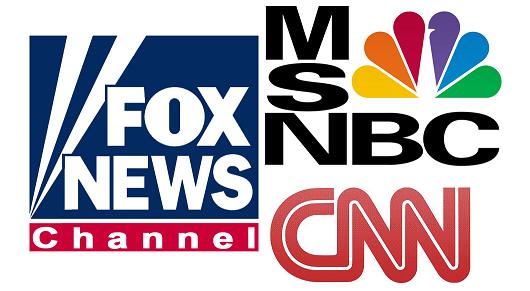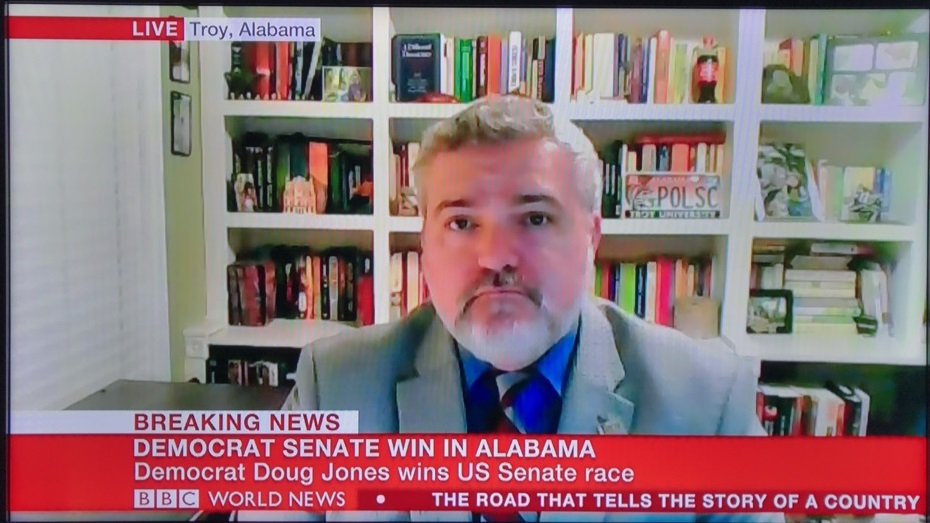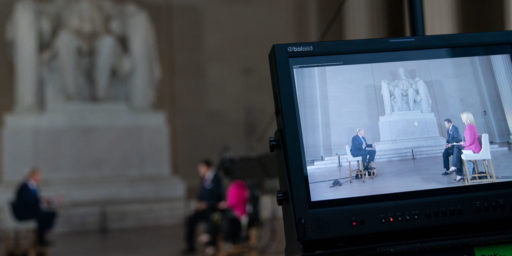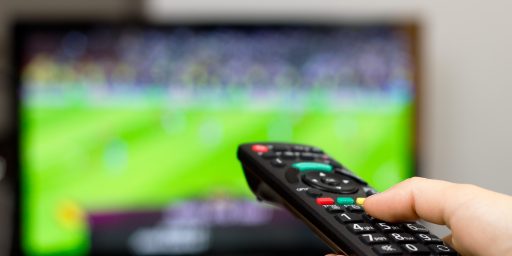The TV Doctors and the Problem of Cable “News”
Cable news "experts" frequently aren't.

WaPo asks a really good question: Dr. Phil and Dr. Oz aren’t coronavirus experts. So why are they talking about it on TV news? This was after Laura Ingraham has Phil McGraw (Dr. Phil) on to discuss opening up the country and Mehmet Oz (Dr. Oz) was on Sean Hannity talking about the need to “our mojo back” and specifically about schools being “a very appetizing opportunity” (which is one of the creepier phrases I have heard in a while).
Of course, McGraw (a psychologist who is no longer licensed to practice) and Oz (a heart surgeon by training) are both media personalities made popular on the Oprah Winfrey Show some years ago and who have had syndicated afternoon talk shows for years.
Neither is an epidemiologist nor expert in infectious diseases or public health. Oz does have an MD.
The article also notes that early (March 3) in this process, Drew Pinksy (Dr. Drew) was dismissing the threat of Covid-19 on Fox News Channel (he has later apologized).
I am surprised Dr. Laura hasn’t made an appearance.
(If I ever start calling myself “Dr. Steve” please get me the help I obviously need).
The WaPo piece answers its own question pretty effectively:
Television rewards the ability to speak in sound bites, and to opine confidently and comfortably on camera, regardless of expertise. Even before television, the practice of elevating the famous to presumed expert status was a long and checkered practice; advertisements have traded on famous names for hundreds of years, whether or not the celebrity had any special knowledge or experience. More recently, cable TV networks have employed pundits, including journalists, with thin credentials to opine about the news of the day, usually about political topics.
All of this underscores a major problem with cable news/talking heads-type programming and is one of many reasons I stopped being a regular consumer of such programming quite some time ago.
Part of my shift was my own experience with being invited on television and radio myself. Blogging as much as I have means that web-searches often lead producers to things I have written on very specific topics. And I am also listed on my university’s database of “experts” willing to talk to the local press.
As a result, I have been called by media outlets near and far over the years. The most bizarre was some journalist in Kurdistan who called me several times for a radio program to ask me about political parties. I talked to some Canadian outlet about immigration several years ago. I was invited to discuss the FARC on a Caribbean radio station (our schedules didn’t sync, which was the same as it pertains to an invite to be on the BBC World Service’s “World Have Your Say”) and so forth.
I was a semi-regular guest for a while on Birmingham (AL) radio program (I think because for a while I was writing columns for the local paper fairly frequently) and also on a Florida program, etc. I have been on statewide PBS and several local TV stations.
My more high-profile was appear on BBC TV to discuss the Doug Jones/Roy Moore election.
Here’s proof (as I foreshadowed a life spent on video meetings–plus it was around 11pm at night and I was wearing sweatpants with my jacket and tie. And I actually wasn’t in Troy, AL, proving you can’t trust everything you see on TV):

I bring all of this up to point out two lessons I have learned about these kinds of media appearances regardless of whether one is talking about the local 6 o’clock news or the BBC.
First, they only vaguely know or understand (let alone care about) the details of your actual expertise. They will not check to make sure that you are qualified as long as you have some general marker they can go with (e.g., you are a Professor of Political Science).
Second, the most important qualifying characteristic is availability.
Once they have identified you (either because of a Google search that found something you wrote or because they saw you quoted in written media, also probably because of googling) the question is: can you be ready at X time for Y minutes (and how flexible can you be about waiting, cancelations and rescheduling, etc.)?
It was also my experience the more willing you were to be flexible–especially if you were able to drop everything on short notice to be on TV or the radio, the more likely they were to call back soon. And, after all, you are working for free and they have air to fill, often on short notice in response to the news of the day.
They are producing a show. Even the more serious news providers like the BBC are still producing a show. And sure, I knew it then and we all know it now, but seeing it up close and personal made it all the harder to take seriously the vast majority of people on cable news who seemed willing and able to pontificate about whatever the host wanted to discuss (see, e.g., Alan Derschowitz as a prime example).
There is an illusion that too many people buy into that watching an hour of TV which features a bunch of “experts” in boxes on the screen.
The is also a third issue, which the article notes, that producers for these show often look for “experts” who will fit a given narrative:
The pandemic has exacerbated a more general problem of confirmation bias, or seeking evidence to validate a preconceived notion, on TV, said Dr. Henry I. Miller, a senior fellow at the Pacific Research Institute in San Francisco and a philosopher on scientific and technological issues.
“The cable networks, in particular, troll for pseudo-experts — some credentialed, some not — who express viewpoints that reflect the biases of the network and/or interviewer” who have booked them, he said in an email. Among the most egregious examples, Miller said, are the talking heads who’ve endorsed drugs such as hydroxychloroquine as a treatment for covid-19 in the absence of reliable clinical trials demonstrating its safety and effectiveness.
This isn’t to say that everyone on TV in this context doesn’t know what they are talking about. I knew what I was talking about when I went on the BBC to talk about Alabama’s US Senate special election. I have a colleague who is an expert on Russian politics and Eastern European relations who was a frequent guest on the BBC and he knows what he is talking about. But I also know that the amount of real research done in the expertise of guests, even at the BBC, is not deep. And it is even more shallow on infotainment shows like Laura Ingraham and Sean Hannity.
The format needed to use TV to actually allow real experts to provide actual information to the public isn’t the one used by most TV outlets. Of course, cable news is not about education, it is about entertainment. Sadly, most people who watch cable TV don’t understand this. And so they end up getting pandemic advice from Dr. Phil as a result.
(BTW, I am pretty sure my co-blogger, Dr. Jim, has had similar media appearance experiences).






I got a call out of the blue years ago from a booker at MSNBC. They wanted me to come on to talk about some hot political issue. I don’t recall the specific topic but it was something I understood only at a superficial level. I told the booker I wasn’t really qualified and blew her off.
I coulda been famous! But I have never seen the point of fame. The only good thing about fame is that sometimes it can help one obtain a far more useful thing: money. In every other way fame is all down-side. Money is power in your hands; fame is power in someone else’s hands.
https://local.theonion.com/lonely-pedophile-wistfully-surveys-deserted-schoolyard-1842883329
Also…
https://www.theonion.com/fox-news-producer-tasked-with-calculating-how-long-it-w-1842923532
The Onion is at least as reliable as FoxNews. I think you just have to take it seriously rather than literally.
Hey! I resemble that remark. (The story behind the handle is both long and boring.)
@Michael Reynolds:
If you’re identified as the author of a specific book, it can help you sell that book. Or so they tell me.
If you can’t get actual doctors to agree to push the company line and bash the libs, get fake doctors to do so.
Problem solved.
I hope Oprah disavows those mercenary fools. She is not on the hook, but she did bring them to prominence on afternoon TV. Oprah giveth; Oprah taketh away.
Weekend Update!
Let’s face facts, most people don’t really care about what actual peer reviewed evidence has to say. I consider this a pretty questioning group but I wouldn’t be surprised if most weren’t taking a supplement regularly or at least on specific occasions like when you feel a cold coming on. This despite the fact that a) study after study shows their complete ineffectiveness in healthy, non-pregnant people with adequate nutrition, and b) the dosage is often wildly off what it says on the label (0% to 500%) and buying from an expensive national brand doesn’t make a difference. Last year a NYT lab analysis of dozens of brands confirmed not only this but that they also contained lots of things that weren’t supposed to be in there and could actually be harmful to some, like nut oil residue.
Once upon a time, I had the VA vanity plate “DOC JAY”
Because I am a big fan of Julius Erving.
@Gustopher:
For the Kid Rock doctorate question, I would think an honorary doctorate from Liberty University would fulfill their requirements nicely.
Isaac Asimov had a doctorate in organic chemistry. He taught biochemistry at Boston University School of Medicine. One anecdote he told from that era was about students who’d ask him “Dr. Asimov, are you a real doctor or a PhD?”
To be honest I don’t think most constant viewers of cable news listen to a specific expert or opinion. It’s the medium that gets them. Most of the dumb pseudo-expert shit is aimed at the gnawing dumbness of its audience. Interestingly enough Dr. Phil’s show often has people who were deceived or are deceivers–the type of person who fakes cancer or thinks they’re married to a celebrity who they’ve never met. He has a style of talking to people which works for the show but not for the person.
Fox and the GOP just politicized this and gave pathetic middle-management dweebs the illusion of being important strategists, thinkers, doctors, scientists, whatever.
On topic:
Dr. Phil Walks Back Controversial Remarks Amid Furor: I Gave ‘Bad Examples’ and Used Wrong Statistics
https://www.mediaite.com/tv/dr-phil-walks-back-controversial-remarks-amid-furor-i-gave-bad-examples-and-used-wrong-statistics
Huh… Almost as if he didn’t know what he was talking about.
Contrarian folks fronting as if they were epidemiologists and statisticians is a growing field.
Expect more soon.
Between Shirley Maclaine, Dr. Phil, Dr. Drew, Dr. Oz, Marianne Wilson, Depak Choprah, The Secret, and Jenny McCarthy’s anti-vaccine crusade, it could be argued that Oprah is personally responsible for most of the anti-science hogwash currently infecting this country.
@Stormy Dragon:
She also made The Bridges of Madison County into a mega-seller, too.
@CSK:
I’m mercenary enough to have considered that, but then came the practical realization that I’d have to actually write a book about politics. The mere thought of this filled me with a sort of enervating dread. (No offense to @Steven). There would be footnotes. There would be a sad little book tour. Worst of all if I wanted to be TV pundit, I’d probably have to live in DC – I had lived in DC, and August in the District is one of the things (like accidentally stabbing myself in the thumb while unpacking a Nerf gun) I hope never to have to experience again. (No offense to @James.)
I did political media for a short while, producing spots for the Democratic Legislative Campaign Committee, and I stopped doing that when I caught a clear vision of a future where I’d be wearing a suit at cocktail parties and having to remember people’s names and pretend to give a fuck what some fat cat had to say. What you’re saying makes a lot of sense, Car Dealer from Knobjob Missouri with an opinion on the malign influence of the Illuminati on Middle East policy. (I don’t know if anyone’s noticed but I’m not good at keeping my opinions to myself.)
So I bailed on political media and wrote GONE. So much more fun. I got to just make shit up, and the amazing thing? People paid me! And think about the intellectual gap between the kind of 14 year-old who’ll read a 3000 page book series, and the average politician. The smartest, most imaginative kids vs. dull-witted narcissists. I got to hang with a much better bunch of humans.
Bullet dodged.
@Michael Reynolds:
Try August in Orlando. It’s Venusian.
My neighbors didn’t have A.C. and used box fans in windows.
@MarkedMan: I believe that you should be careful about dumping on those who take “supplements” without distinguishing between the different supplements. I take two at the recommendation of my primary physician and specialists: AREDS (Age related eye disease study) for macular degeneration and red wheat rice for type two diabetes. Are you suggesting I am a fool for doing so? Are you a TV doc?
@Michael Reynolds:
Well, you don’t necessarily have to write about politics to be invited onto tv, radio, and podcasts,: I never did. True crime has been popular for a long time, for which I suppose we can thank Truman Capote and In Cold Blood.
It’s true that writers have always had a better class of fan.
@dmichael: I’m suggesting that it is extremely unlikely that what you are buying contains what it says it does. And that it is almost as unlikely that there is any good scientific evidence that it has any medical benefit, even in a pure form.
I’m sorry if that offends you but it is almost certainly correct.
@MarkedMan:
That depends, to a large degree, on how you buy it. If you buy red wheat rice as a foodstuff, it is very likely to contain exactly what it says it contains. If you buy it as a pharmaceutical “supplement”, then who knows? And the effects on blood sugar of various foodstuffs have been thoroughly studied. We’re not talking St. John’s wort or ginkgo biloba here…
I remain bemused that the only member of the Trump cabinet who has hands-on experience of hospital administration, Ben Carson, has as yet (to the best of my knowledge) never been asked by his boss to join in the milling throng of eminent Americans advising him how to exercise his absolute authority over the response to SARS-CoV-2. Perhaps Trump, like many Americans, has forgotten he exists.
@Ken_L:
Probably taking a nap.
That man is the sleepiest looking person I have ever seen.
Nothing wrong with naps. I love em.
Steven, I’m guessing you saw my related Facebook post yesterday.
James Fallows has a good book on this subject, Breaking The News. Because the news is a show, there’s a system of perverse incentives at play. Not only is it OK for TV-friendly people to state strong opinions on subjects about which they know nothing, they are actively encouraged to do so. The queasy feeling I got during the short time I had as a talking head was that the people behind the camera would have been overjoyed if I had said something ridiculous but “interesting,” and there would have been no consequences if I had. Turns out I was right.
@Kingdaddy: I did not see that post, but will look for it.
I do remember you being on CNN (yes?) during the first Gulf War, yes? I was wondering if you might chime in here.
@MarkedMan: I’m only offended by your arrogance. You didn’t address what I said. Why do three of my medical providers, primary, eye doctor and eye surgeon, advise me to take and continue to take AREDS supplements? Perhaps because studies have shown them to work? “The Age-Related Eye Disease Study was a clinical trial sponsored by the National Eye Institute, one of the National Institutes of Health in the United States. The study followed 3640 individuals for an average of 6.3 years between 1992 and 2001. The researchers concluded that high levels of antioxidants and zinc can reduce some people’s risk of developing advanced AMD by about 25 percent.” The list of ingredients on the container show all the ingredients and their quantities. Are Bauch & Lomb mislabelling their products in violation of consumer protection laws? Because you are so certain of your beliefs, I am confident you will be taking them to court. I will leave the issue of red wheat rice to DrDaveT’s response.
@dmichael: I’m not being arrogant, although I do admit that when you said you were taking a supplement I assumed it was from a traditional supplement company and therefore almost certainly snake oil. But just now you mentioned Bausch and Lomb, a legitimate medical company. So I visited the National Eye Institute informational page on AREDS and for specific conditions it looks to be significantly beneficial and I’m sure your doctors are giving you the right advice, and I hope you have great success with your treatment. Bausch is a real medical company, making many products that require FDA registration and pre-market clearance. I’ve consulted for one of their divisions and know they take their quality process very seriously, and so I’m sure they are actually providing exactly the ingredients on the label just as if it was a regulated prescription drug as opposed to an unregulated supplement. And there are quite a few cases where supplementing diet can have great curative effects. Folic acid for pregnant women. Iodine. Protein for Kwashiorkor.
None of that changes my opinion about supplements in general or the companies that make them. For many years Consumer Reports would pick a supplement and buy some from about thirty different manufacturers and find, consistently, that they contained anything from 0-500% of the active ingredient, with most being closer to that zero mark. The NYT article I mentioned above showed that nothing had changed and worse, a number of the supplements were contaminated with potentially dangerous substances such as gluten and peanut oil.
@MarkedMan: One of the many reasons it’s probably better to try to get your nutrients from food rather than from pills. Chow down on the veggies, guys….
I spent forty years in the IC, in the military and as a civilian, and retired four years ago. There was a time when I would watch the news and not see someone I knew being presented as an expert or commentator, but since 9/11, it has become much more common to see a former colleague on one of the major news networks offering their expertise (or something approximating expertise) during discussions. I expect to see some I knew in a leadership role doing so and I respect and most of them and what they bring to the table, but I can only shake my head at some of those they put out there, and I wonder how they came into those positions.
About six weeks after the 9/11 attacks, I was at CENTCOM HQs in Tampa, as an intelligence augmentee in the targeting cell. We were working 24/7 with rotating 12-hour shifts, and we had monitors hanging from the ceiling with various data and video feeds and always at least one cable news broadcast. One day we were sitting there, a bunch of (mostly) intelligence professionals, and someone loudly said “Holy S&#%!” and we noticed he was looking at the news. Immediately, we all looked up and our jaws dropped to see a retired field-grade army intelligence officer (who shall remain nameless), known by many of us, being presented as an intelligence expert and offering his opinions on how to go about getting Al-Qa’ida out of their mountain caves. The first reaction was shock and that was quickly followed by laughter. Needless to say, we weren’t impressed. After all, we KNEW the guy and his many limitations. How he got that job, I have no idea. I don’t think he lasted long.
Since then, especially in retirement, I see former colleagues being called upon to impart their expertise — retired military personnel, former CIA case officers, and former analysts from various agencies. I’m rarely impressed and get a good chuckle out of it.
On the other hand, I’ve seen several former IC colleagues and acquaintances make their way into Congress in the last several election cycles and, by and large, they have impressed me.